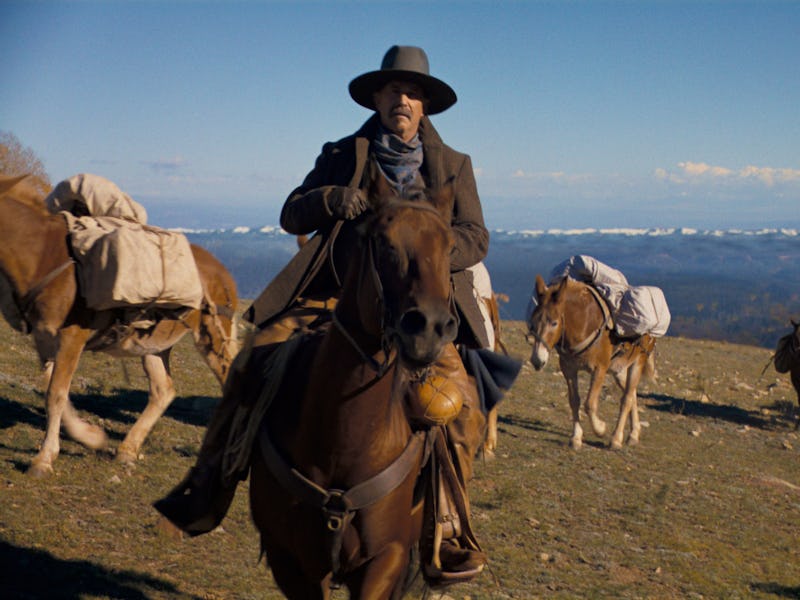Kevin Costner’s Horizon: An American Saga is a Sprawling Slog
The first part of Costner’s multi-chapter western is all set up, no structure.

In Kevin Costner’s Horizon: An American Saga, the myth of the American West becomes both a calling card and a curse. Throughout the film, pamphlets advertising plots of land with the slogan “Horizon!” are discovered, read, and taken as gospel by characters who dream of starting anew in the great empty expanses of the west. But those expanses are not so empty: they are fiercely guarded by the Indigenous American tribes who have lived there for centuries and are rightfully wary of the deluge of settlers coming into their sacred lands.
So begins Horizon, the first chapter in what Costner hopes to be a four-part film saga that will renew the traditional sweeping western epic. But the major problem with Horizon: An American Saga - Chapter 1 is that it also buys into that myth of the American West. Costner imbues the film with a grandeur befitting western films of the ‘60s, lingering on sprawling vistas and magnificent silhouettes, while John Debney’s soaring orchestral score makes every moment feel achingly romantic. But every magnificent vista and each swooningly romantic moment can’t make up for the fact that Horizon is excruciatingly dull.
Sienna Miller stars as Frances Kittredge, a widow of a horrific attack on a western settlement by Apache warriors.
Costner pulls out all the stops to make the most epic movie of the year, introducing a massive cast that gets slowly introduced over the course of the movie’s even more massive three-hour runtime. In an age where the old classics are being steadily forgotten in favor of bombastic superhero tentpoles, Costner wants Horizon to be watched steadily, patiently, and venerably, to fully absorb its grandiose vision.
It’s a vision that consists of setting up every character and plot thread like chess pieces — before cutting off the film before it even gets started. Set in 1860s America, the movie opens with settlers measuring their plots of land while Indigenous scouts watch warily, a prelude that pays off with a violent opening battle scene as Apache warriors slaughter the residents of the small town that sprung up from those first plots of land. The survivors of the slaughter get rescued by the Union Army, setting the stage for a sweet romance between the resilient widow Frances Kittredge and the gallant First Lt. Trent Gephardt (Sam Worthington). Another storyline introduces the hardened Lucy (Jena Malone), whose murder of a man who appeared to have wronged her leads her to flee from his vengeful sons (Jamie Campbell Bower and Jon Beavers). In another story, Hayes Ellison (Costner, whose first appearance doesn’t happen until the one-hour mark) finds himself the unexpected protector of a prostitute (Abbey Lee) and the child in her care.
Kevin Costner doesn’t show up until one hour into Horizon.
By the time a whole new ensemble is introduced two hours into the film (led by a raring-to-go Luke Wilson, no less), it becomes less and less clear what Costner’s vision for this saga is. We see these characters, and we see how some intersect, and how some don’t, but the sprawling scope of Horizon feels too scattered, and the dozens of characters and storylines too unwieldy, for a feature-film format. The interweaving storylines feel fit for a TV series more than a multi-part film saga — even the introduction of new characters at every hour-mark resembles the start of a new episode. By the time we get to know some of these characters, we cut to even more new ones, making the process of watching Horizon more of an exhausting experience than exhilarating one, bogged down by its sluggish, half-developed subplots, and barely interesting characters.
With Horizon, which Costner co-wrote with Jon Baird, the filmmaker appears to making this movie for the sole purpose of playing out all his favorite western standards: the dignified damsels, prostitutes with hearts of gold, noble soldiers, slimy bounty hunters, and bloody cowboys-versus-Indians showdowns. Costner never pretended to be reinventing the western with Horizon, but his slavish devotion to the hallmarks of the genre feel dated and archaic more so than warmly nostalgic. Costner makes halfhearted gestures at bucking some of the western genre’s more troubling tropes — the Apache tribes are afforded a handful of scenes in which they berate the aggressive Pionsenay (Owen Crow Shoe), whose hostility towards the “white eyes” prompted him to lead the attacks against the settlers in their land — but the film ends up mostly perpetuating the dangerous “savage Indian” trope typical of westerns. It’s clear Costner’s interest is in maintaining the image of the traditional sweeping western, and as beautiful as those images are, they were already becoming obsolete three decades ago when Costner first conceived of the project.
Horizon is sprawling and cluttered, yet incomplete.
In the 36 years since Costner first started developing Horizon, one has to wonder whether his ambitions got the best of him. But even with all the time he was afforded, most of his characters feel like little more than archetypes, while the storylines aren’t interesting enough to compel us to stick around for what comes next. One particularly baffling part of the movie happens at the end, when we’re treated to a montage of scenes that essentially play like a trailer for the next film. It makes it feel like even Costner is desperately promising us the rest of the story is worth finishing.
Many are hoping for Horizon to lead a resurgence in old-fashioned cinema — a return to the kind of tactile epics that have been lost in the sea of CGI gunk. But we should not be hinging our hopes on Costner as the savior of cinema, and Horizon’s prospects as the turning point for a renaissance for old-school epics are as dim as they come.